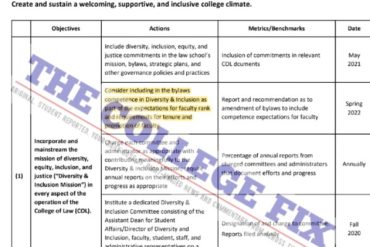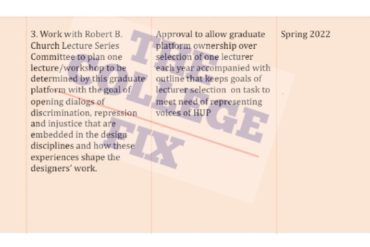
A slate of diversity plans filed by individual schools within the University of Tennessee-Knoxville will require some professors to commit to Diversity, Equity and Inclusion practices to gain tenure, create a new critical race center on campus, and embed diversity-based curricula throughout the university, according to plans obtained by The College Fix.
The College Fix obtained the plans from 20 different academic departments and administrative divisions, which together totaled 322 new pages of diversity regulations, requirements and goals to improve equity on campus.
The plan submitted by the Division of Diversity and Engagement vows to partner with the campus Critical Race Collective to create a center to “enhance research and scholarship capacity in this area of study and identify current racist policies and practices on campus.”

The College of Law submitted an expansive plan, including provisions to create bylaws “that require a commitment to diversity for faculty tenure and advancement.”
The law school also plans to embed diversity and inclusion “throughout the existing curriculum” by spring 2022 as well as launch a bias reporting system separate from the one maintained by the school. It will also create a certificate program in diversity and inclusion within the college.
Diversity work as a condition of advancement and tenure status for professors was also included in plans submitted by the School of Engineering and School of Social Work.
Kerry Gardner, assistant director of news and information for UT-Knoxville, told The College Fix via email Tuesday the public institution is “committed to attracting and retaining a diverse student body, faculty, and staff by creating a welcoming campus where all people can be successful, feel like they have found a place to belong, learn from each other, and express themselves.”
“To fulfill that commitment, in fall 2020, each college and vice chancellor unit created plans tailored to their specific areas,” Gardner said. “These are living documents that provide clarity and transparency with respect to the university’s diversity efforts. The plans will be updated over time as needs change and we evaluate the effectiveness of our efforts.”
In the wake of the death of Minneapolis man George Floyd in May 2020, UT-Knoxville convened a Diversity Action Plan Implementation Committee, which then required individual departments within the university submit their own “Diversity Action Plan” to improve equity within the school.
Gardner said the diversity plan project is consistent with the UT Board of Trustees’ diversity statement of October 2020.
While each Diversity Action Plan is required to set a number of specific goals and a deadline for achieving those goals, each department’s plan differs.
The diversity division proposes creating “a small working group” to “conduct a historical review of every named building and major outdoor space on campus to ensure that all spaces reflect a positive antiracist legacy.”
The division also recommends increasing funding to create two faculty lines in Africana studies “beginning immediately to facilitate transitioning it from a program of study to a department.”
“We will identify all current classes in which race and racism are principal focuses and work with Faculty Senate and Undergraduate Council to highlight or require those classes in Vol Core,” reads the diversity division’s proposal.
The law school also committed to further support of “affinity groups” such as the Black Law Students Association and the Latino Law Student Association. The president of the BLSA did not respond to a request by The College Fix to comment.
Each school addresses inequality in ways specific to that school’s subject area. The School of Architecture, for instance, sets a goal of eliminating racism in building design by “opening dialogs of discrimination, repression and injustice that are embedded in the design disciplines and how these experiences shape the designers’ work.”

Similarly, the College of Agriculture vows to identify and “remedy factors contributing to underrepresentation of minorities in agriculture disciplines,” and the veterinary school commits to increased diversity within charitable organizations such as “PAWSitive Impact,” a wellness club “focused on addressing the prevalence of poor wellness within the veterinary community.”
The university’s libraries in their diversity plan vow to “examine library fines and fee-based services for students to determine their efficacy and equity.”
The libraries suggest potentially reducing or eliminating fees for curricular projects as part of their plan, and working with the university to leverage their purchasing power to “place weight on contracts with minority-owned companies and/or companies who demonstrate a commitment to diversity and inclusion.”
The libraries also commit to hosting a “Wikipedia edit-a-thon focusing on Digital Collections resources highlighting women and African-Americans.”
While each school and department is able to come up with their own ways to promote diversity and inclusion, each plan is required to address a number of topics, including culture and climate, faculty and staff recruitment and retention, student recruitment and retention, engagement and outreach, curriculum, and graduate student professional development.
Within these parameters, most schools and departments proposed similar diversity goals, such as including more cultural training for students and faculty, recruiting more instructors from historically black colleges, and increasing “inclusive practices” where possible within classes.
To that end, the Division of Student Life Diversity Action Plan includes a goal of requiring 100 percent of courses to “provide evidence of learning activities relevant to the outcome related to social justice and inclusion.”
Similarly, the School of Social Work proposed increasing scholarships for students who plan to enter professions “promoting social justice and antiracism.” The College of Arts and Sciences committed to “look for an increase in courses that recognize that race, gender identity, sexual orientation and ethnicity/culture are commonly intersectional identities among many that individuals might have.”
Nonetheless, individual departments and divisions still managed to propose unique problems to solving racism and inequality on campus. For instance, the UT-Knoxville Office of Advancement proposed removing the names of potential job candidates from resumes and cover letters when initially shared with search committees in an effort to eliminate discriminatory hiring practices.
The College of Communication and Information proposed increasing funds to individual schools to “allow historically underrepresented PhD students to support their dissertation research, beyond what is already provided by the respective school.”
According to the proposal, funds may be used to support data collection, conference travel, or other activities that advance their research programs.
The College of Nursing proposed to “increase awareness of cultural competence through the
consideration of a policy for recognition of non-Judeo-Christian holidays.”
Perhaps the most unique proposal, however, came from the Haslam Business School, which considered programs to attract more military students as “diversity.”
The school suggested implementing a Military Visit Day, enhancing promotion of current military students on the College of Business website, and creating a military recruitment video.
“A campus climate that helps all people feel like they have a place – no matter who they are or where they are from – is essential for student recruitment, retention, and graduation, and employee recruitment and retention,” said Gardner, the school spokesperson.
“We are working to meet the needs of Tennessee employers by preparing our students to enter a global workforce, thrive in a diverse workplace environment, and understand how to effectively exchange differing points of view.”
ALERT: Check out our new Campus Cancel Culture Database!
IMAGES: Shutterstock; University of Tennessee Knoxville
Like The College Fix on Facebook / Follow us on Twitter






Please join the conversation about our stories on Facebook, Twitter, Instagram, Reddit, MeWe, Rumble, Gab, Minds and Gettr.